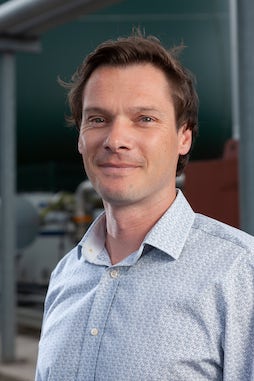Can The Anaerobic Digestion Industry Make It To Net Zero?
- Commercial
- -
The anaerobic digestion (AD) industry is uniquely positioned within the waste management sector, offering a renewable energy solution that powers itself using food waste.
We were lucky enough to grab some time with our CCO Lee Dobinson recently to discuss all things carbon footprint, Scope One, Two & Three emissions and what he thinks the road to Net Zero for the food waste industry looks like.

AD is essentially renewable energy that just so happens to use food waste to generate power. This link between waste reduction and energy production sets the AD industry apart, aligning its goals with those of food producers to minimise waste.
"If I could reduce people's food waste down to a paracetamol-sized pill and pop that into our tanks once a year, I absolutely would."
Lee Dobinson
Lee used the analogy above to emphasise the industry’s commitment to condensing waste streams and reducing the carbon footprint associated with transportation and packaging. He wants to see fewer lorries on the road covering less distance. This is one of the reasons we carefully consider the radius between our nearest site and the potential customer when taking on new waste streams.
Unlike traditional waste management companies that rely heavily on tipping fees and haulage, the AD industry’s primary income comes from the biogas produced from waste. This unique model incentivises the industry to work closely with food producers to reduce waste at the source, ultimately saving both parties money and, indeed, carbon emissions.
Evaluating the Carbon Footprint
The AD industry has a distinct advantage regarding carbon emissions. Lee explains, “We’re carbon negative for scope one and two emissions.” Scope one emissions, which refer to direct emissions from owned or controlled sources, are minimal for AD facilities and limited primarily to vehicle diesel usage and electricity consumption.
The most significant emissions for the AD industry fall under scope three, which includes indirect emissions from the value chain. “Our biggest [scope three emissions] come from using third parties’ diesel to transport the waste to us,” he clarified.
ABDA recently said they believe that by 2030, Anaerobic Digestion could provide up to 30% of the UKs domestic gas supply, which Lee feels is a big number! We process over 100,000 tonnes of food waste each year in each of our plants, so the availability of biogas is there to ultimately support this ambitious goal as best we can, but whether that will be in just a few years, we can’t be sure.
Pathways to Net Zero Anaerobic Digestion
"There's real scope for carbon savings within the AD industry in the future."
Lee, acknowledging the industry's potential to drive sustainable transportation solutions, further reducing its carbon footprint.
Moreover, the industry is actively working to decarbonise its supply chain by encouraging suppliers to transition to biogas or biomethane-powered vehicles.
While challenges remain, such as accounting for the carbon footprint of purchased biodiesel, the AD industry’s commitment to sustainability drives ongoing efforts to minimise its overall environmental impact, along with exploring alternative fuel sources for generators and forklifts. Picture that: a full circular economy within one AD plant…
Looking to the future
The anaerobic digestion industry’s unique model, which inherently aligns waste reduction with renewable energy production, positions it as a leader in sustainable waste management. While the industry already boasts a relatively low carbon footprint, particularly in scope one and two emissions, it continues to explore innovative solutions to further reduce its environmental impact and achieve net zero emissions.
The AD industry is paving the way for a more sustainable future through collaboration with food producers, investment in sustainable transportation, and the decarbonisation of supply chains. As other energy companies grapple with reducing emissions, the AD industry’s proactive approach and inherent advantages position it as a model for sustainable practices within the waste management and energy sectors.
As industry leaders, education forms an important part of our ethos here at BioteCH4, be that by running demonstrations at local schools or hosting plant tours for Local Authorities.
Helping your food waste journey
If you’re interested in working with an AD processor but not sure where to start, or simply want to learn more about how correct food waste management could support your business’ journey to Net Zero, the team are happy to talk!



